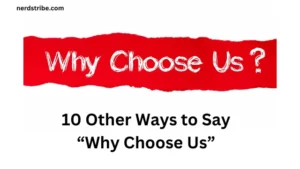When writing or speaking, we often rely on the phrase “According to” to reference sources, share facts, or support our arguments. While it’s functional and universally recognized, using it repeatedly can make your communication monotonous and dull. Imagine delivering a compelling presentation or writing a persuasive essay, only for your audience to lose interest because of repetitive phrasing.
Expanding your vocabulary with alternatives to “According to” can enhance your writing, improve clarity, and keep your audience engaged. Whether you’re a student, professional, or creative writer, having a variety of phrases at your disposal is essential to maintaining reader interest and avoiding redundancy.
This blog post will introduce you to 10 other ways to say “According to” and explain when and how to use each one. With examples and clear guidance, you’ll discover how to elevate your communication and ensure that your words always resonate with your audience.

Contents
- 1 1. As Per
- 2 2. Based On
- 3 3. According To What [Source/Person] Said
- 4 4. As Reported By
- 5 5. As Indicated By
- 6 6. In The Words Of
- 7 7. As Mentioned In
- 8 8. Cited By
- 9 9. In Reference To
- 10 10. According To Research/Studies
- 11 Conclusion
- 12 FAQs
- 12.1 Why should I use alternatives to “According to”?
- 12.2 Which alternatives are best for formal writing?
- 12.3 Are these alternatives suitable for everyday conversations?
- 12.4 How do I choose the right alternative?
- 12.5 Can I use these alternatives in academic writing?
- 12.6 What’s a good alternative for storytelling or quotes?
1. As Per
A concise alternative that works well in formal and professional contexts.
- Key Meaning: Refers to something based on established rules, guidelines, or instructions.
- Usage: Often found in business, legal, or instructional settings.
- Example: “As per company policy, employees must submit their timesheets by Friday.”
2. Based On
A straightforward phrase that emphasizes the foundation of information or analysis.
- Key Meaning: Indicates that something is derived from a specific source or data.
- Usage: Commonly used in reports, presentations, or academic writing.
- Example: “Based on recent studies, exercise improves mental health significantly.”
3. According To What [Source/Person] Said
A conversational variation that adds a personal touch.
- Key Meaning: Attributes information to a specific individual or group.
- Usage: Ideal for informal discussions or storytelling.
- Example: “According to what Dr. Smith said, the treatment is highly effective.”
4. As Reported By
A more formal option often used in media, journalism, or research.
- Key Meaning: Highlights information shared by a specific organization or source.
- Usage: Useful in news articles or academic citations.
- Example: “As reported by The New York Times, the economy is expected to grow this year.”
5. As Indicated By
An elegant phrase that points to evidence or data for support.
- Key Meaning: Suggests that the source provides clear evidence or signs of the claim.
- Usage: Suitable for scientific or analytical discussions.
- Example: “As indicated by the survey, customer satisfaction has increased by 15%.”

6. In The Words Of
A compelling way to quote someone directly.
- Key Meaning: Emphasizes the exact phrasing or viewpoint of the source.
- Usage: Best used when quoting influential figures, authors, or experts.
- Example: “In the words of Albert Einstein, ‘Imagination is more important than knowledge.’”
7. As Mentioned In
A simple alternative that references previously discussed material.
- Key Meaning: Refers to something already cited or brought up in the conversation.
- Usage: Effective in essays, speeches, or follow-up explanations.
- Example: “As mentioned in the previous chapter, renewable energy is a growing industry.”
8. Cited By
A formal phrase commonly used in academic and legal contexts.
- Key Meaning: Indicates that the information comes from a specific citation or source.
- Usage: Perfect for research papers or scholarly articles.
- Example: “Cited by multiple historians, the event marked a turning point in world history.”
9. In Reference To
A versatile phrase that connects your point to a specific source or topic.
- Key Meaning: Suggests that the information or statement relates to a particular context.
- Usage: Works well in both formal and informal communication.
- Example: “In reference to the email, the meeting has been rescheduled to 3 PM.”
10. According To Research/Studies
A context-specific variation that emphasizes authority.
- Key Meaning: Relies on scientific or academic backing for credibility.
- Usage: Best for essays, research papers, or persuasive writing.
- Example: “According to research, people who sleep 7-8 hours perform better cognitively.”
Conclusion
Words matter, especially when you’re building credibility or delivering important information. Replacing “According to” with suitable alternatives can enhance your writing or speaking, make your message more dynamic, and keep your audience engaged. Whether you’re addressing an informal chat, drafting an academic paper, or delivering a professional report, these alternatives help you communicate more effectively.
By using phrases like “As indicated by,” “In reference to,” or “Based on,” you not only avoid repetition but also tailor your language to fit the context. This flexibility demonstrates your command of language and strengthens your arguments, making them more persuasive and impactful.
Start incorporating these alternatives into your communication today. The variety will add depth to your language, making you a more compelling writer or speaker. Small changes in wording can lead to a big impact in how your message is received and remembered.
FAQs
Why should I use alternatives to “According to”?
Alternatives prevent redundancy, enhance clarity, and allow you to tailor your language to different contexts, making your communication more effective.
Which alternatives are best for formal writing?
Phrases like “As Per,” “Based On,” and “Cited By” are ideal for formal or professional documents.
Are these alternatives suitable for everyday conversations?
Yes, conversational options like “In the words of” and “According to what [source] said” work well in casual settings.
How do I choose the right alternative?
Consider the context, audience, and tone. For formal writing, use precise phrases like “As Reported By.” For informal chats, try “As Mentioned In.”
Can I use these alternatives in academic writing?
Absolutely. Phrases like “Cited By” and “According to Research” are perfect for academic or research-based contexts.
What’s a good alternative for storytelling or quotes?
Use “In the Words Of” to directly quote someone and make your narrative more engaging.








